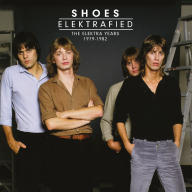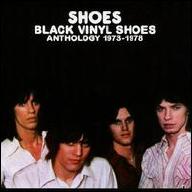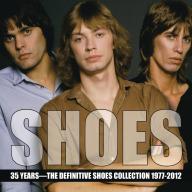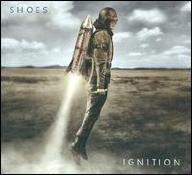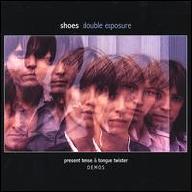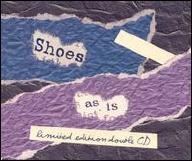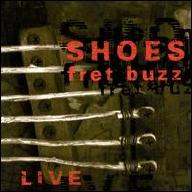Shoes were formed in Zion, Illinois in 1973 by Jeff Murphy, John Murphy, and Gary Klebe, with the Murphys and Klebe all sharing songwriting duties and Skip Meyer joining as drummer in 1976. While the group played live on rare occasions, their natural home was in the studio, and Jeff Murphy, an electronics wiz and audiophile, created their own makeshift four-track studio in his home, where they could spend hours putting the sounds in their heads on tape. Released in 1975, Un Dans Versailles was Shoes' official debut, but it appeared in a very limited edition (only 300 copies) and received limited distribution through their own Black Vinyl label, while their second LP, Bazooka (1976), initially went unreleased.
Arriving in 1977, Black Vinyl Shoes changed the game for the band. Though it barely appeared in record stores, enough critics and key music industry people heard the record to start a word-of-mouth buzz. Eventually, Greg Shaw, the head of Bomp! Records, heard the record and arranged for the band to release one single, the brilliant "Tomorrow Night"/"Okay," on his label. The independent PVC Records label gave Black Vinyl Shoes a nationwide reissue, and soon Shoes were the toast of the rock press, earning rave reviews with much ink spent describing their unusual road to success. A contract with Elektra Records soon followed, and the label released the group's next three textbook power pop albums: Present Tense (1979), Tongue Twister (1981), and Boomerang (1982). Despite the instantly accessible, catchy quality of the songs and plenty of positive press, radio failed to warm to the band, and as a consequence, they were unable to achieve mainstream success. Among specialists, however, these albums, along with the debut, stand as the high points of the '70s and '80s power pop era, brilliantly crafted and highly influential.
Elektra dropped Shoes after the release of Boomerang, and Meyer left the band. The remaining three retreated back to the home studio, returning with Silhouette in 1984, a more subtle, keyboard-oriented album initially released only in Europe. Having won back the rights to Black Vinyl Shoes and their Elektra catalog in 1987 Shoes issued Shoes' Best, a collection that pulled together the best material from their first 12 years and brought their music to compact disc for the first time. The CD revived interest in Shoes and gave the Black Vinyl label a new lease on life. Returning to their Short Order Recorder studio, they released Stolen Wishes in 1990, a polished effort that emphasized keyboards and vocal harmonies. Shoes remained intermittently active in the '90s, releasing Propeller (1994) and the live Fret Buzz (1995), as well as issuing music from other like-minded bands on Black Vinyl. The collective efforts of Shoes in the mid-'90s led to a power pop revival in indie rock circles in the U.S., and the band stayed active working on reissue projects (including 2007's Double Exposure, a double CD of demos taken from the albums Present Tense and Tongue Twister), the occasional live show, and running the Short Order Recorder studio.
In 2011, the group reconvened and began recording new tracks for an album. The finished product, Ignition, was released by Black Vinyl in 2012. That same year, Real Gone Records released the career-spanning anthology 35 Years: The Definitive Shoes Collection 1977-2012. In 2018, the British Cherry Red label issued Black Vinyl Shoes: An Anthology 1973-1978, a three-disc box set that included Black Vinyl Shoes, Bazooka, and Un Dans Versailles in full, along with several rare and unreleased tracks. Two years later, the label issued Elektrafied: The Elektra Years 1979-1982, a collection that included Present Tense, Tongue Twister, and Boomerang, plus a wealth of demos and the live EP Shoes on Ice. ~ Chris Woodstra & Mark Deming, Rovi
|
1
|
|
Osaka |
|
2
|
|
Too Late |
|
3
|
|
Tomorrow Night |


